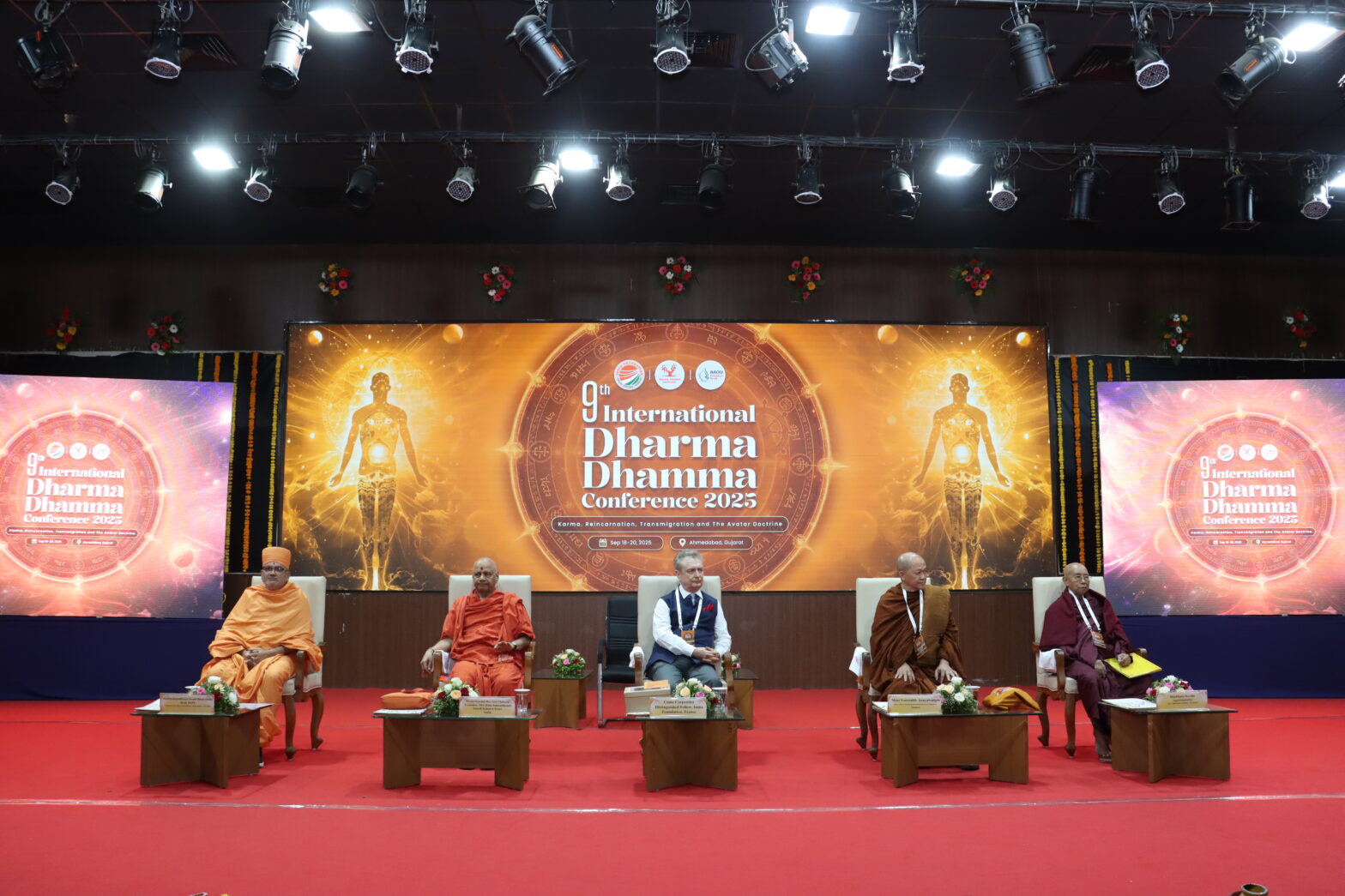The 9th International Dharma-Dhamma Conference, jointly organised by India Foundation and Dr. Babasaheb Ambedkar Open University, Ahmedabad, was inaugurated on 18 September 2025 at the University campus. With the theme “Karma, Reincarnation, Transmigration, and the Avatar Doctrine”, the three-day conference brought together over 200 scholars, spiritual leaders, and policymakers from sixteen countries that includes Armenia, Bhutan, Cambodia, Canada, France, Georgia, India, Japan, Mauritius, Myanmar, Nepal, Singapore, South Korea, Sri Lanka, Thailand and Vietnam. The conference reaffirmed its position as a premier global platform for dialogue between Hindu and Buddhist traditions, aimed at fostering harmony, interconnectedness, and a shared philosophical framework for the emerging world order.
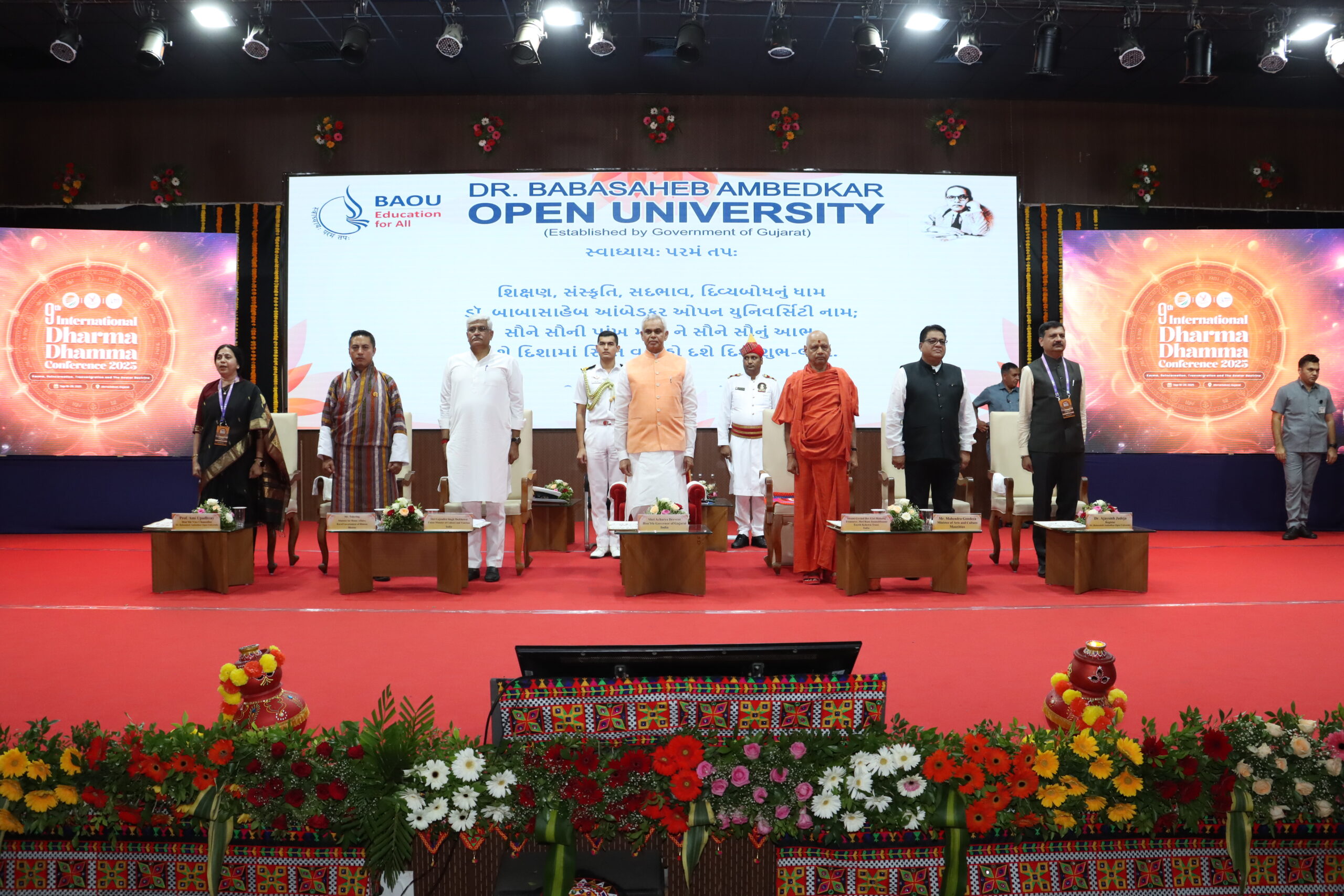
The inaugural session was graced by eminent dignitaries including Shri Acharya Devvrat, Hon’ble Governor of Gujarat; Shri Gajendra Singh Shekhawat, Hon’ble Union Minister of Culture and Tourism, Government of India; H.E. Mahendra Gondeea, OSK, Minister of Arts and Culture, Mauritius; H.E. Tshering, Minister of Home Affairs, Royal Government of Bhutan; Swami Govinda Dev Giri Ji Maharaj, Treasurer, Shri Ram Janmabhoomi Teerth Kshetra Trust and Prof. Dr. Ami Upadhyay, Vice Chancellor, Dr. Babasaheb Ambedkar Open University.
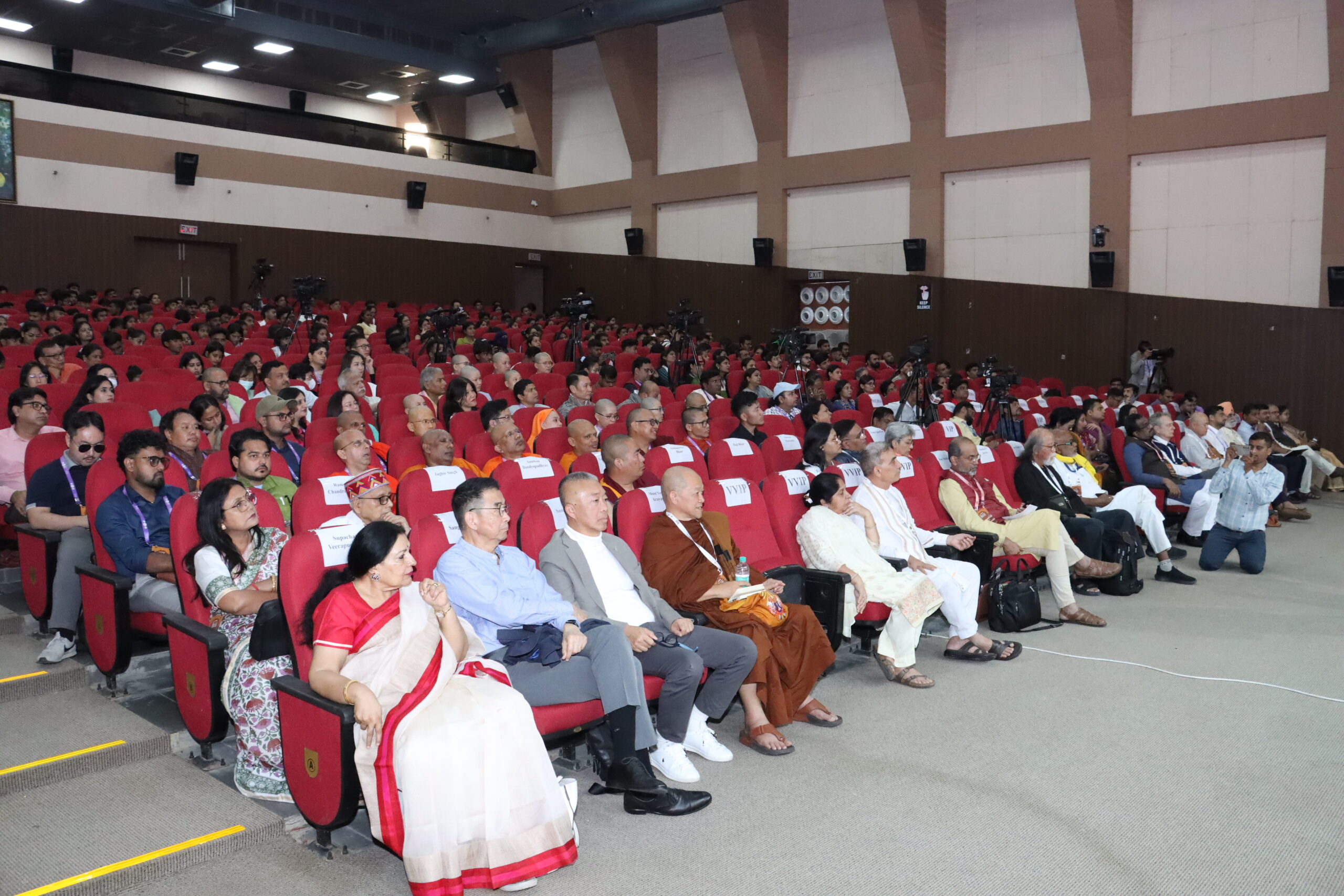
Over the course of three days, a total of 91 research papers were presented across 15 parallel sessions, constituting a significant part of the 9th International Dharma Dhamma Conference. Jointly convened by India Foundation and Dr. Babasaheb Ambedkar Open University, Ahmedabad, Gujarat, this segment provided a rigorous academic platform for scholars, researchers, and practitioners to share innovative perspectives on the overarching theme “Karma, Reincarnation, Transmigration and The Avatar Doctrine.”
Inaugural Session:
The inaugural session of the 9th International Dharma-Dhamma Conference began with an inspiring address by Swami Govinda Dev Giri Ji Maharaj, Treasurer, Shri Ram Janmabhoomi Teerth Kshetra Trust. Welcoming the gathering on behalf of India Foundation and as the Chair of the organising committee of the 9th DDC 2025, he spoke of India as the cradle of spiritual traditions including Hinduism, Buddhism, and Jainism. Emphasizing that the foundation of Indian thought is Dharma, he noted, “Our ancestors have taught us non-aggression and moral elevation, with the eternal motto: Sarve Bhavantu Sukhinah — may all be happy. Differences may exist here and there, but the sameness of our values is far greater.” He urged participants to strengthen the ties of brotherhood, focus on unity rather than differences, and collectively face the challenges confronting humanity.
H.E. Tshering, Minister of Home Affairs, Royal Government of Bhutan, extended warm appreciation to the hosts for convening the timely dialogue. He reflected on the need to reaffirm Dharma in a world dominated by materialism and secular thought: “Dharma is the timeless source of peace, harmony, and happiness. Both Hinduism and Buddhism remind us that life is interconnected, that we are bound together in a shared destiny.” He explained how the Buddhist principle of pratītyasamutpāda (dependent origination) underscores this interdependence, linking karma, reincarnation, and transmigration to a shared reality of existence. Citing contemporary challenges like climate change, inequality, and polarization, he stressed the urgent need for compassion and collective action. Concluding, he invited delegates to Bhutan’s forthcoming Global Peace Prayer Festival in November 2025, framing it as a continuation of the eternal cycle of Dharma.
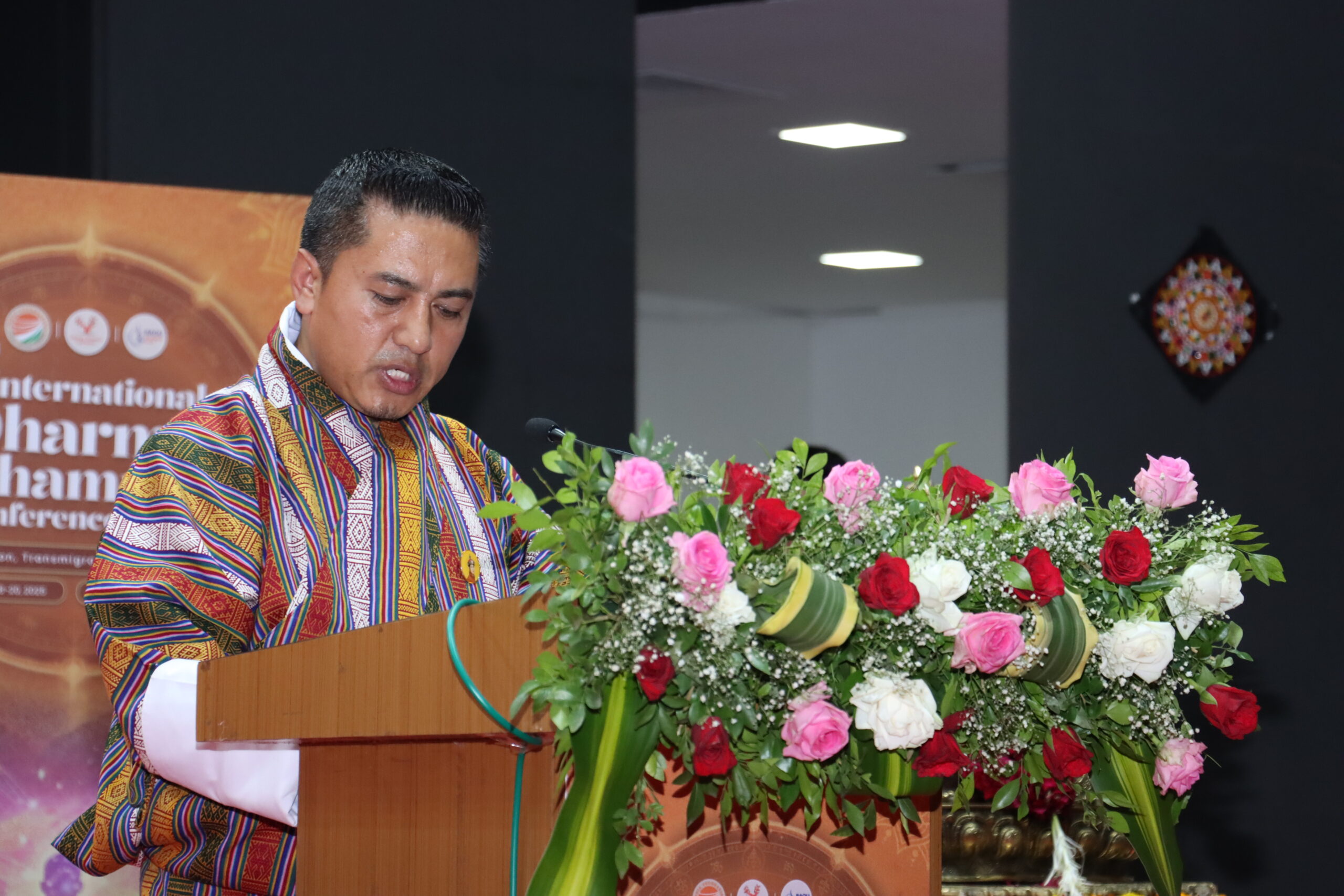
From Mauritius, H.E. Mahendra Gondeea, OSK, Minister of Arts and Culture, situated his country’s cultural experience within the spirit of Dharma. He remarked, “Mauritius is a living testament to the enduring relevance of Dharma in the modern world. Our multicultural society thrives on tolerance, dialogue, and respect — values deeply rooted in Dharma traditions.” Drawing on the conference theme, he underlined how karma and reincarnation can serve as guiding principles for reconciliation, non-violent diplomacy, and environmental responsibility. He noted that peace is not simply the absence of conflict but the presence of justice and shared prosperity. Recalling the words of Mahatma Gandhi — “The best way to find yourself is to lose yourself in the service of others” — he urged the gathering to build a new world order anchored in Dharma, compassion, and sustainability.
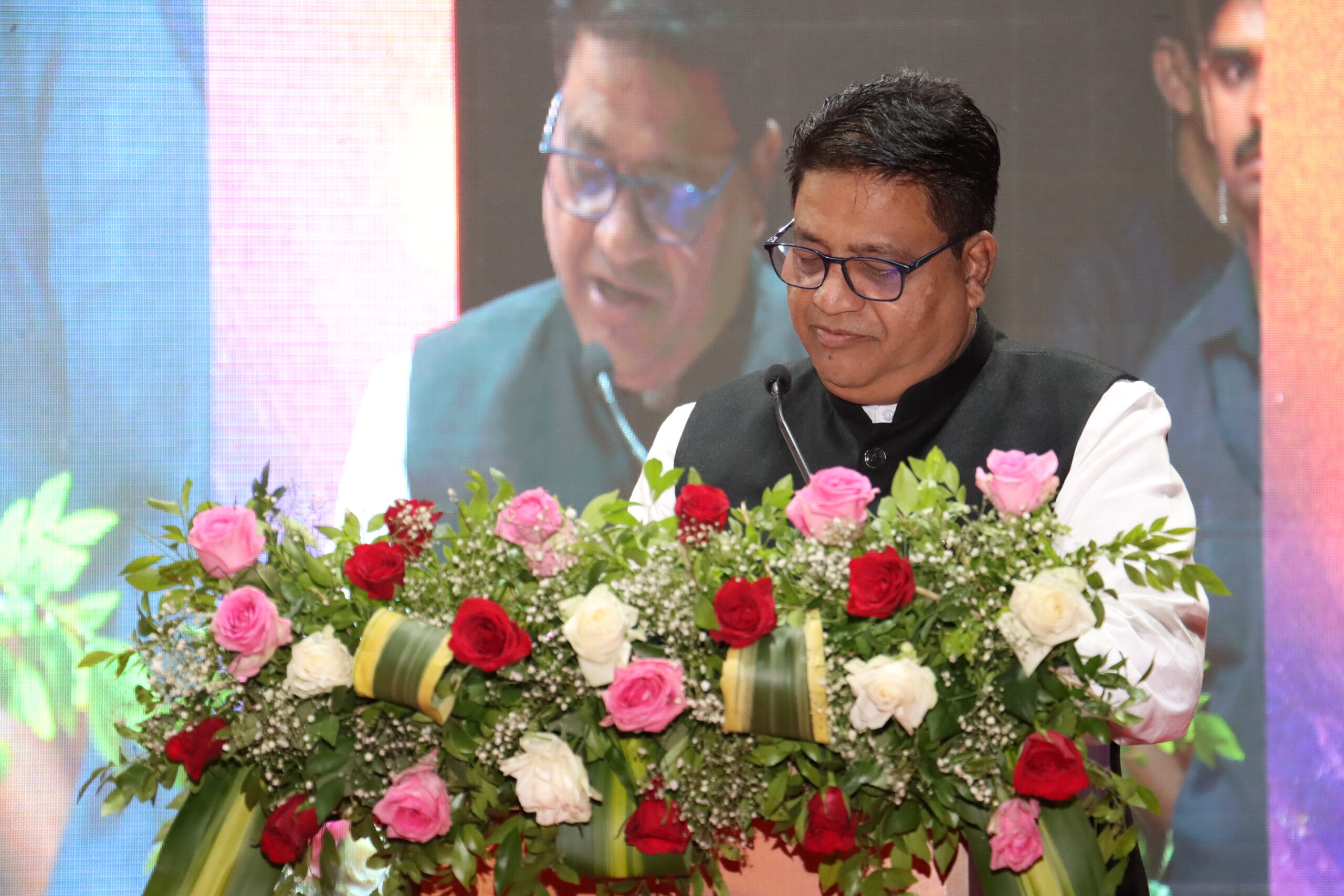
Delivering his address, Shri Gajendra Singh Shekhawat, Hon’ble Union Minister of Culture and Tourism, Government of India, posed profound questions on human existence, noting that civilizations flourish not by power alone but by their capacity to engage with philosophy and truth. He clarified that karma is not fatalistic destiny but the architecture of responsibility, while reincarnation teaches humility and interconnectedness. Highlighting the avatar doctrine, he explained, “When Dharma declines, the moral order renews itself through reformers, saints, and great movements. This doctrine is not just about divine descent, but about hope — a reminder that compassion reappears when the world needs it most.” He called for the application of ancient wisdom to modern challenges, from climate change to cultural diplomacy, and reaffirmed India’s commitment to preserving and sharing its spiritual heritage globally.
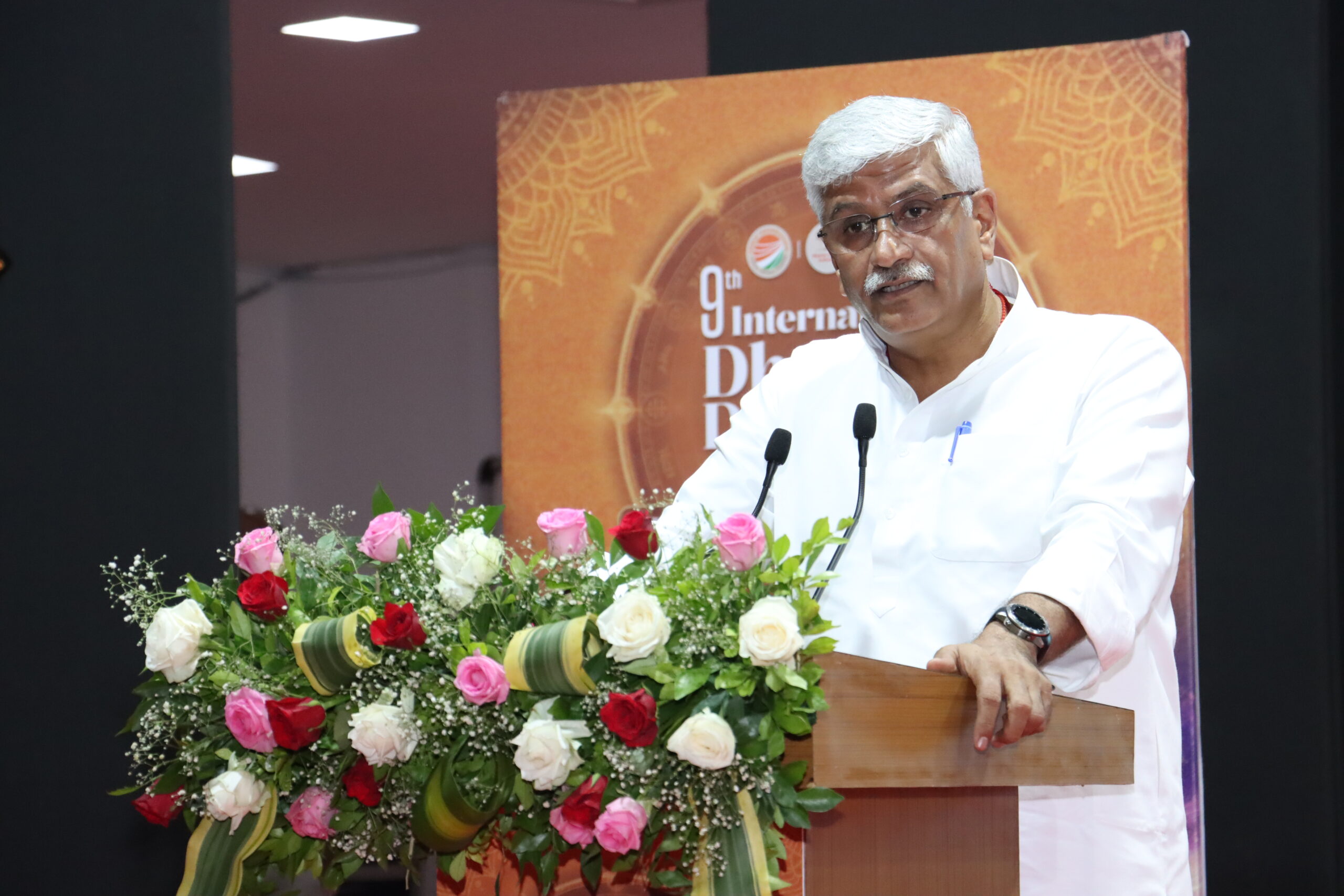
Shri Acharya Devvrat, Hon’ble Governor of Gujarat, in his address congratulated the organizers and emphasized that philosophy defines the true purpose of life. He highlighted the Vedas as the world’s oldest repository of knowledge and recalled the eternal dictum Dharmo Rakṣati Rakṣitaḥ, noting that Dharma alone sustains the balance between violence and non-violence, Dharma and Adharma, and guides humanity toward righteousness. Invoking Maharshi Dayanand Saraswati, he underlined the importance of the doctrine of rebirth in understanding the continuity of life and Dharma. He stressed that Dharma was created to guide human conduct in every aspect of life and explained that practical living according to Dharma means not lying if we do not want others to lie to us and not looking at another’s sister or daughter with ill intent if we expect the same for our own. He further noted that the opposite of non-violence is violence, and the opposite of truth is falsehood; when these are applied to society, whatever sustains it is Dharma, and what fails to do so is Adharma, asking rhetorically whether society could survive even a single day on falsehood.
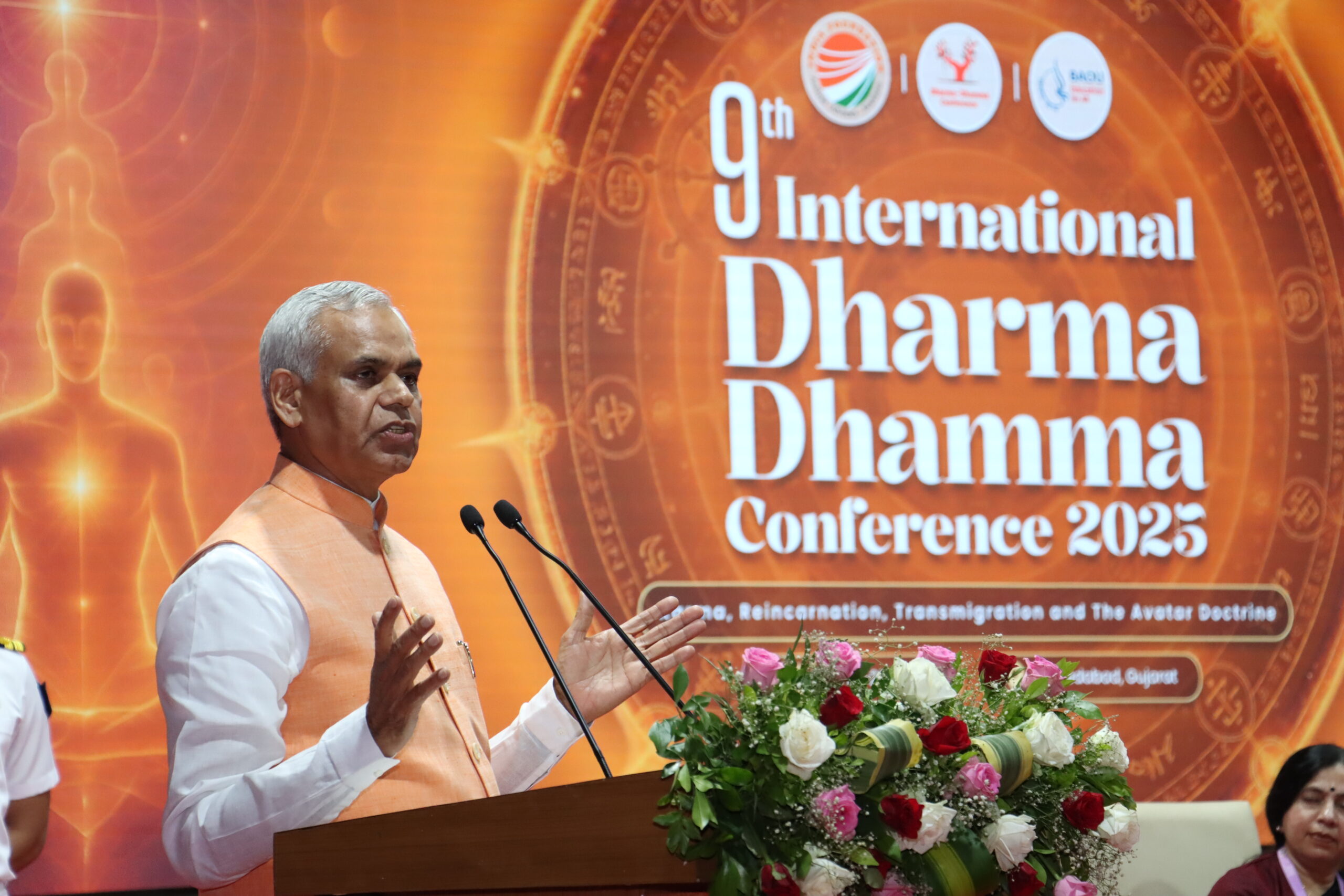
Benedictory Session:
The benedictory session of the 9th International Dharma Dhamma Conference was chaired by Mr. Come Carpentier, Distinguished Fellow, India Foundation and Co-Chair of the 9th DDC 2025, who opened the dialogue with profound reflections on the eternity of the universe. Drawing parallels with the Kalpavriksha and the Bodhi Tree, he reminded the audience that the law of karma remains central to the functioning of existence. He noted that even modern scientific explorations, including quantum physics, continue to echo these timeless insights, reaffirming how ancient wisdom remains aligned with contemporary understanding of the cosmos.
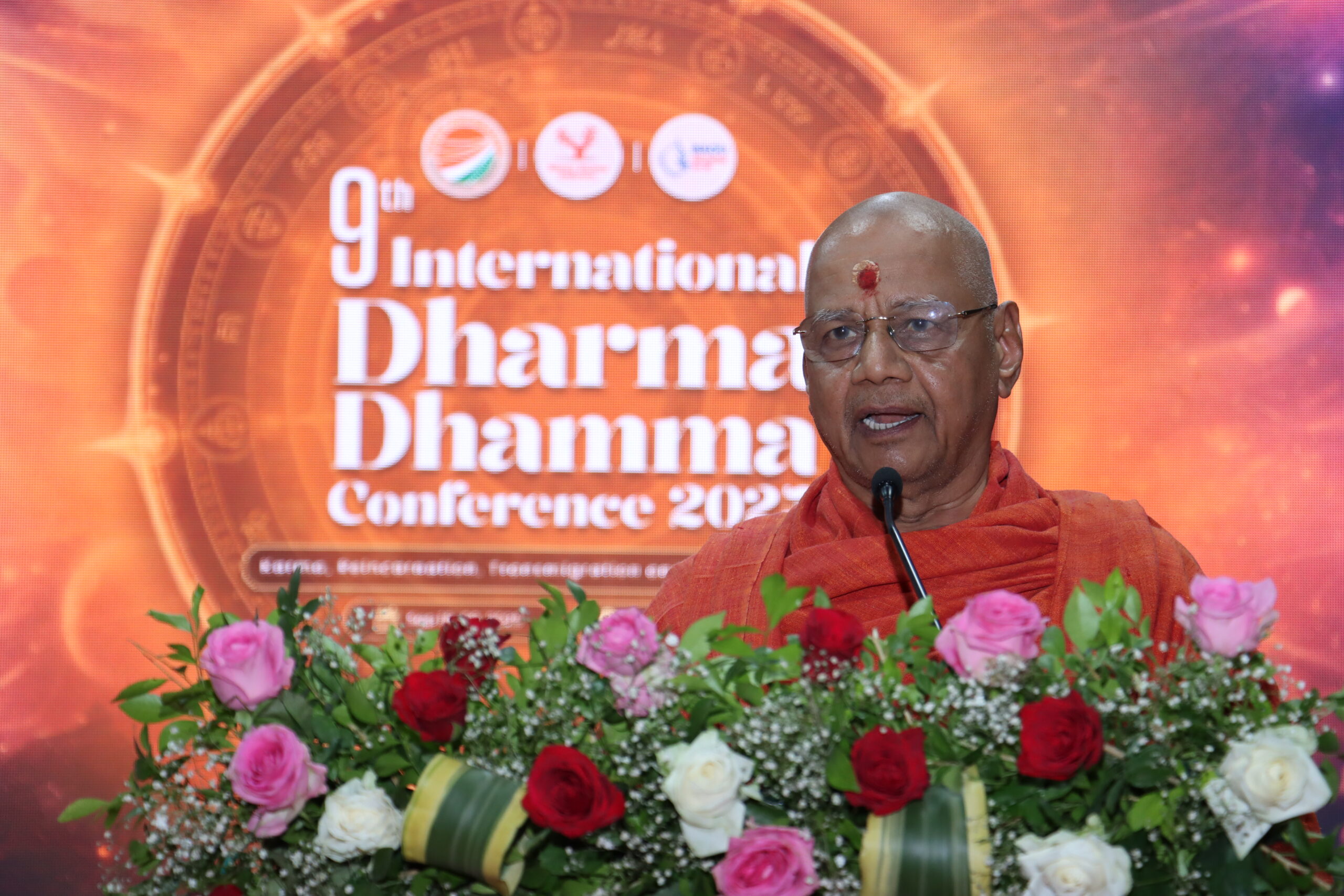
Swami Govinda Dev Giri Ji Maharaj, Treasurer, Shri Ram Janmabhoomi Teerth Kshetra Trust, India, reflected on karma as noble action that underpins life across Vedic, Jain, and Buddhist traditions. He explained the Vedic classification of karma and stressed the need for balance in life, quoting the prayer “Asato Ma Sadgamaya, Tamaso Ma Jyotirgamaya.” Speaking on the doctrine of avatars, he emphasized that incarnations arise whenever moral equilibrium falters, with their purpose being the restoration of righteousness and harmony in society.
From Thailand, Most Venerable Arayawangso, Chief Abbot of Buddhapojhariphunchai Forest Monastery (D) under Royal Patronage of HRH Princess Bajrakitiyabha Narendira Debyavati, the Princess Rajasarini Siribajra Mahavajrarajadhita, spoke of Dhamma as natural law, encompassing the laws of action, biology, and physics. Drawing from Buddha’s enlightenment, he explained central Buddhist concepts such as mano kamma (mental action), idapaccayata(conditionality), and paticcasamuppada (dependent origination), highlighting the interconnectedness of existence. Reaffirming the Four Noble Truths, he underscored the enduring relevance of Dhamma as the guiding principle of wisdom and liberation.
Mahamahopadhyaya Swami Bhadreshdas, Head, BAPS Swaminarayan Research Institute, Akshardham, New Delhi, described the conference theme as addressing the mystery of the entire universe. He emphasized that the pursuit of moksha illustrates the depth of Indian philosophical thought. Reflecting on the eternal struggle between dharma and adharma and the varied types of karma, he stressed that sincere fulfillment of one’s kartavya (duty) leaves an enduring legacy. Citing the story of Nachiketa and principles of the Bhagavad Gita, he affirmed that righteous action and spirituality form the bedrock of Dharma’s continuity.
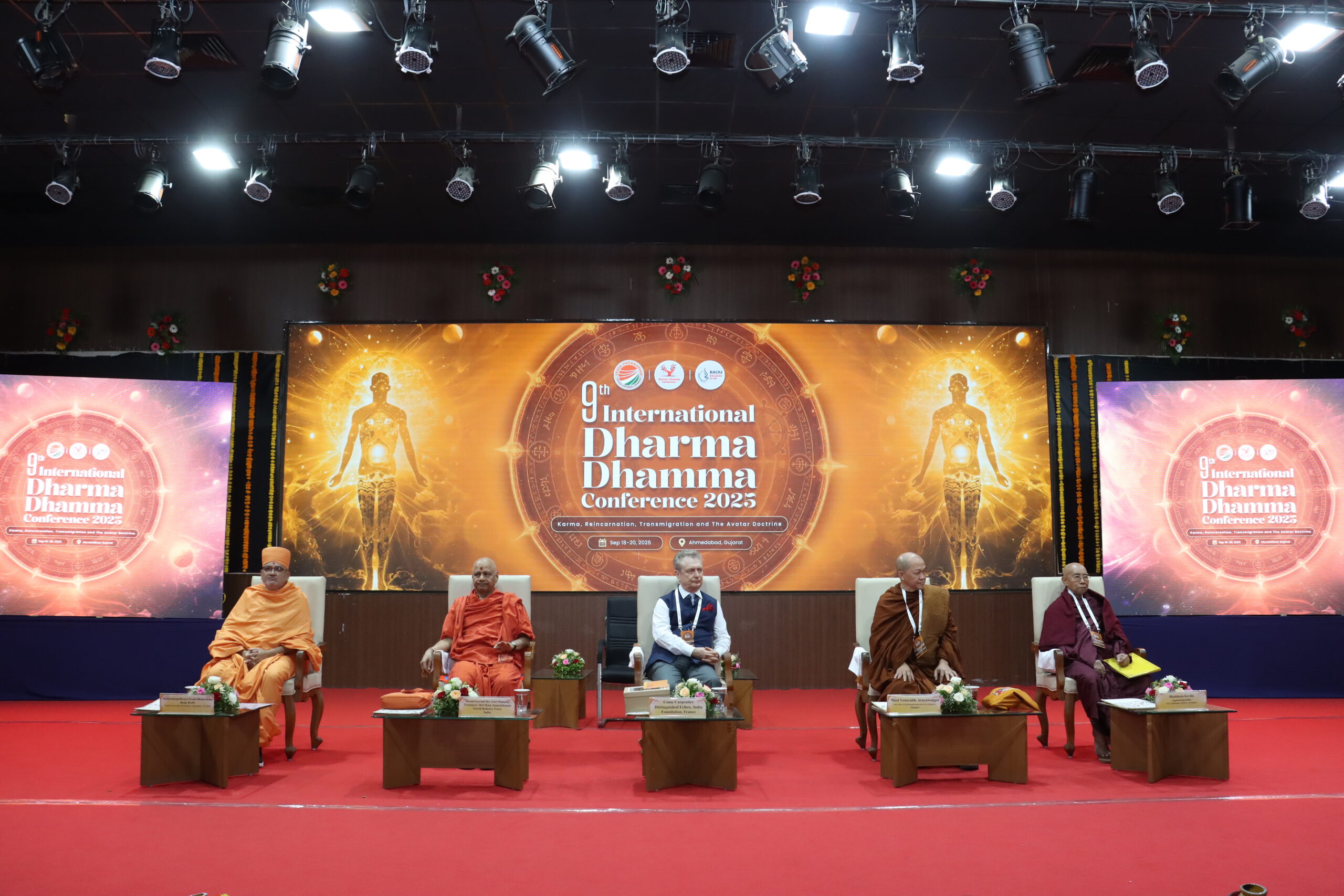
Concluding the Benedictory session, Bhaddanta Kovida, Aggamahapandita, Aggamahasaddhammajotikadhaja, Vice Chairman of the State Sangha Maha Nayaka Committee, Myanmar, offered his blessings. He affirmed the relevance of Dhamma as a universal guide for humanity, emphasizing its role in fostering peace, compassion, and harmony in an interconnected world.
The benedictory session thus captured the spirit of the conference, bringing together diverse traditions in a collective affirmation of Dharma and Dhamma as eternal pathways for balance, wisdom, and global harmony.
2nd S. R. Bhatt Memorial Lecture – 9th International Dharma Dhamma Conference:
Dedicated to the memory of the eminent philosopher Late Prof. S. R. Bhatt, the second S. R. Bhatt Memorial Lecture at the 9th International Dharma Dhamma Conference celebrated his lasting contributions to Indian philosophy and intercultural dialogue. The session provided an opportunity to reflect upon his vision of philosophy as a bridge between civilizations and a guide to spiritual awakening.
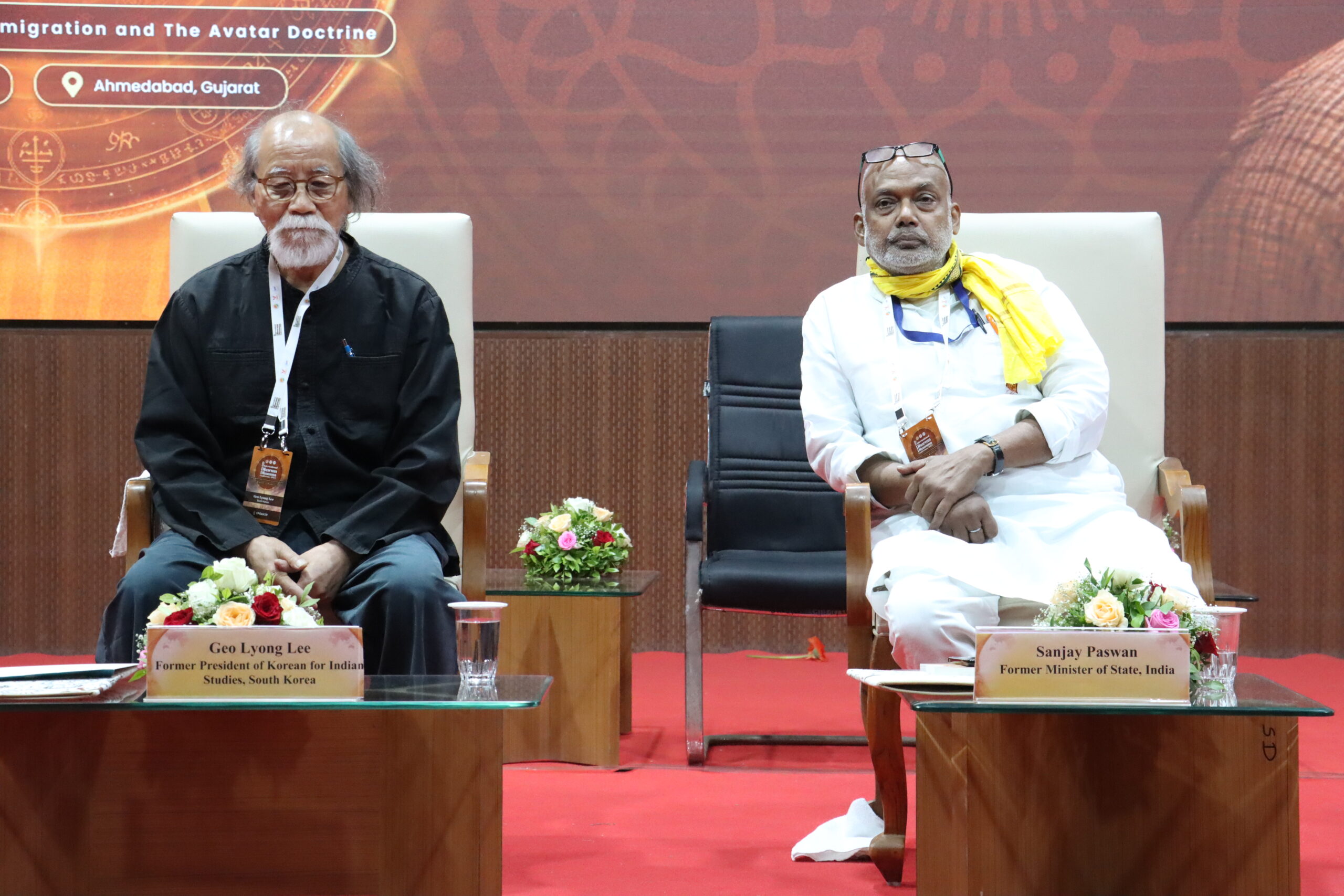
The session was chaired by Dr. Sanjay Paswan, Former Minister of State, India, who emphasized that self-discovery is realized through Dharma and spirituality, while yoga offers a vital path to stress reduction and inner balance. He reflected that every religious tradition begins as an idea, evolves into a belief, and ultimately matures into a philosophy. Citing India’s rich philosophical heritage, he noted how its scriptures and traditions have illuminated the global understanding of spirituality. He further remarked that the Dharma Dhamma Conference, as an international platform, enables diverse philosophical perspectives to converge, reinforcing that philosophy is the path to awakening the consciousness of the mind.
The memorial lecture was delivered by Prof. Geo Lyong Lee, Former President of the Korean Society for Indian Studies, South Korea, who began with a poem dedicated to Prof. S. R. Bhatt. In his address, he explored the profound influence of Ramanujacharya’s Vishishtadvaita Vedanta while drawing insightful comparisons between Shankaracharya’s Advaita Vedanta and Korean philosophical traditions, underlining their shared dimensions. He reflected on the philosophical inquiry into the origin of the universe and stressed that, in the present era, humanity’s foremost goal must be peace. He also highlighted Korea’s historical role as a significant center of Buddhism, illustrating the deep spiritual ties across civilizations.
The session concluded with a vote of thanks by Dr. Rajiv Bhatt, son of Late Prof. S. R. Bhatt, who expressed heartfelt gratitude to the speakers, dignitaries, organizers, and participants for honoring the memory of his father and contributing to the success of the memorial lecture.
Plenary Session 1 –Day 2
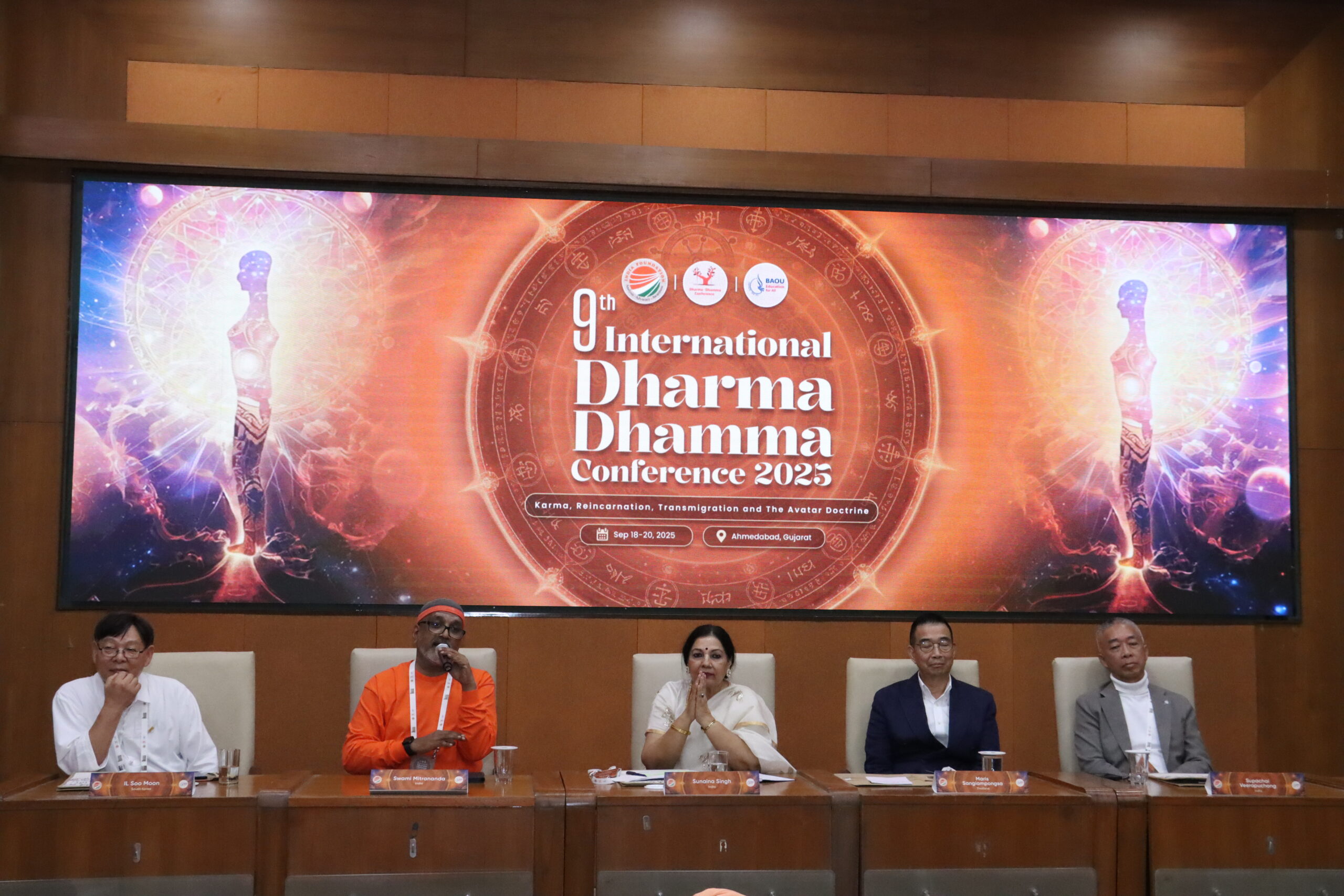
Chaired by Prof. Sunaina Singh, Former Vice-Chancellor, Nalanda University, the session underlined the importance of comparative reflection: Prof. Singh recalled the widespread presence of transmigration doctrines—from Vedic and Buddhist thought to Pythagoras and Platonic currents—and urged participants to situate the conference’s debates within long genealogies of thought while exploring shared parameters across traditions.
Swami Mitrananda, Spiritual Teacher, Chinmaya Mission, stressed the centrality of spiritual discipline and the graded methods of sadhana that accommodate seekers at different stages. He outlined four pragmatic stages of inner evolution—from outwardly driven action to dedicated japa practice and, ultimately, to steady meditation—and argued that if formal meditation proves difficult one may begin by dedicating all actions to the Divine or practising detached action (karma-phala vairagya). His exposition highlighted the inclusivity of Indian spiritual systems, which prescribe different practices for different temperaments and thereby make inner transformation widely accessible.
Dr. Supachai Veerapuchong, Secretary-General, BodhiGayāVijālaya 980 Institute, Thailand, described his institute’s applied work—Dhamma Yatras, SAMVAD talks and community projects—and opened with a short documentary showcasing those initiatives. He argued that the true “motherland” is where Dharma is embodied, not merely studied, and emphasised simple ethical injunctions (rooted in the five precepts) and mindful breathing as practical tools to control emotion, reduce suffering and make spiritual teachings lived realities. Drawing on personal testimony, he urged leaders to first listen, then reflect, and finally implement Dharma’s principles in public life.
Mr. Maris Sangiampongsa, Former Minister of Foreign Affairs, Thailand, traced the institutional history behind regional Dharma initiatives and reflected on his own ordination and transformation. He described how ordinary professionals—business people, civil servants and ministers—have been renewed through disciplined practice, and he presented the institute’s mission to translate Buddhist principles into everyday business ethics and collaborative models. Emphasising Asia’s centrality in the twenty-first century, he advocated applying Dhamma to foster cooperation rather than competition among nations and enterprises.
Prof. Il Soo Moon, Director, International Sati Institute; Emeritus Professor, Dongguk University College of Medicine, South Korea, introduced a neuroscientific reading of Buddhist psychology, framing mind-space as a subjectively constructed virtual field that arises during perception. Drawing on concepts such as anusati(recollection/memory image) and classical accounts in the Saṃyutta Nikāya, he explained how perceptual influxes shape mental representations and how disciplined practice can modulate these processes—thereby linking ancient doctrinal categories to contemporary cognitive neuroscience.
Plenary Session 2 – Day 2
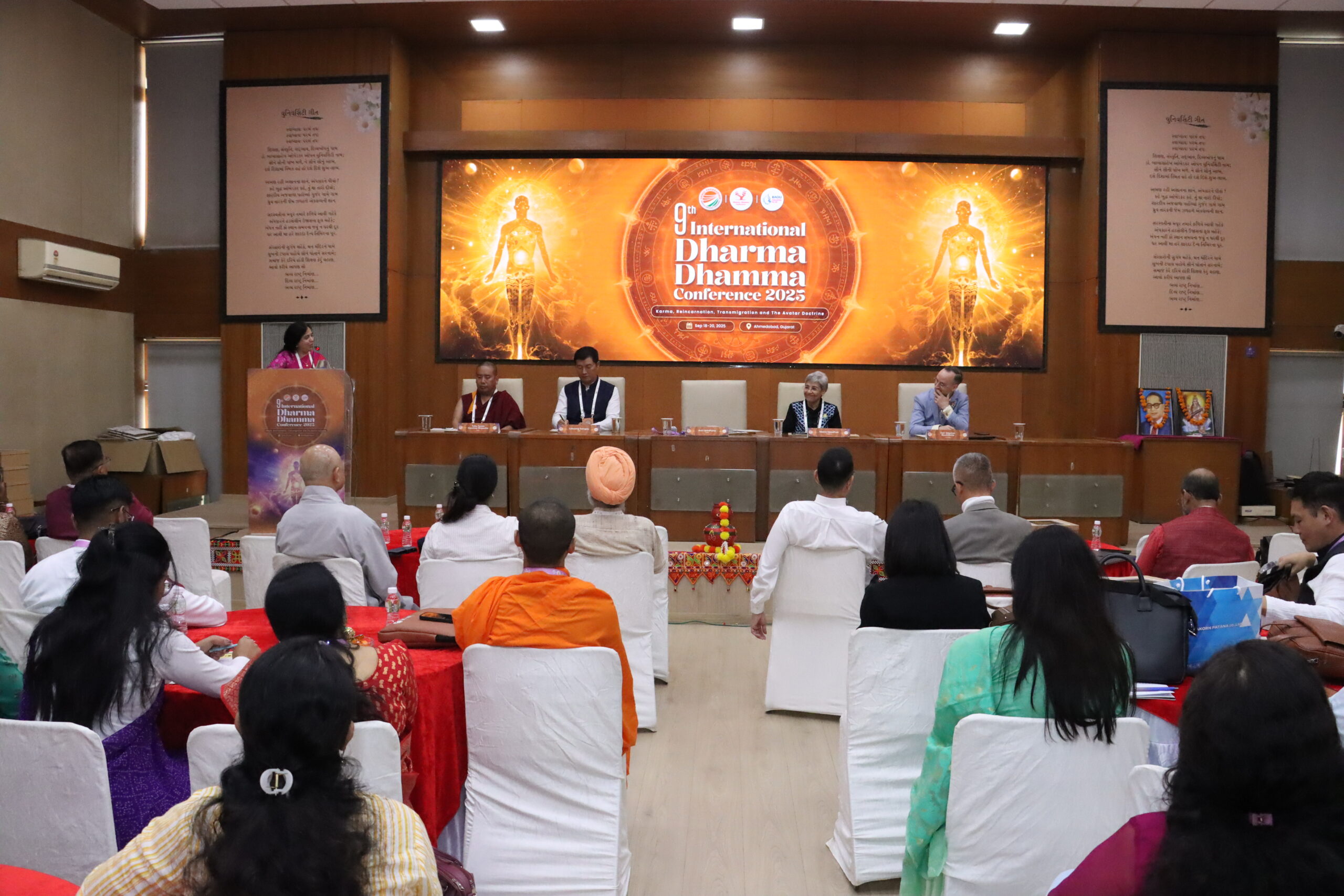
Prof. (Dr.) Ami Upadhyay, Vice Chancellor, Dr. Babasaheb Ambedkar Open University, Gujarat, reflected on the deep connection between Dr. B. R. Ambedkar and Buddhism, linking the Dashavatara tradition, karma, and classical dance as a medium of spiritual and cultural expression. Quoting “Yatho manah thatho bhava” (as is the mind, so is the becoming), she emphasized the importance of mindfulness in one’s actions and explained how karma makes the journey of life continuous, mirrored in the cycle of birth and rebirth.
Ms. Veena Upadhya, Assistant Secretary-General for Foreign Affairs, BodhiGayāVijālaya 980 Institute, Thailand, spoke on the role of karma and reincarnation in shaping human destiny, noting how Buddha’s visions of past lives and his conscious decision to teach highlight the inescapability of karma. Drawing on the Upanishads and Buddhist teachings, she underlined the importance of awareness, good actions, and the Eightfold Path, stressing that true peace lies within and that purification of the mind transforms life and community.
Dr. Karl-Stéphan Bouthillette, Professor, Manipal Academy of Higher Education, examined karma as both problem and paradox, arguing that in Jainism and Buddhism it was not a guarantee of cosmic justice but a mechanism binding beings to saṁsāra. He described renunciation as “ascetic resistance”—a refusal to participate in the karmic economy of worldly life. While acknowledging modern reinterpretations of karma as activism and ecological care, he warned that celebrating action may reinforce the very cycle traditions sought to escape, urging detachment, clarity, and a recognition that samsara “was never great and cannot be repaired.”
Tulku Tenzin Gyurmey Rinpoche, Founder, Thubten Shedrubling Foundation (TSF), Tawang, offered an in-depth explanation of the Tulku system in Tibetan Buddhism, grounding it in the Mahayana ideal of bodhisattvas returning to the world out of compassion. He outlined the history of reincarnation in Tibet, beginning with the Karmapa in the 12th century, and explained why High Lamas reincarnate—through karmic connections, prayers of compassion, and disciples’ requests. He detailed the rigorous procedures for identifying reincarnations, including signs, tests, and oracles, and emphasized that the system is rooted in both philosophy and devotion.
Dr. Lobsang Sangay, Senior Visiting Fellow, East Asian Legal Studies Program, Harvard Law School; and Former Sikyong (President) of the Central Tibetan Administration, spoke candidly about India’s place in history and the present. He contrasted the concept of karma with contemporary global crises such as wars, authoritarianism, and refugee flows, questioning why self-correction seems absent. He highlighted India’s ancient role as a center of knowledge and Buddhist diplomacy under Ashoka, and urged investment in infrastructure, institutions like Nalanda, and Buddhist cultural diplomacy. Warning that China has outpaced India in Buddhist soft power, he called for revival of India’s heritage to regain leadership in the global spiritual and cultural sphere.
Plenary Session 3 – Day 3
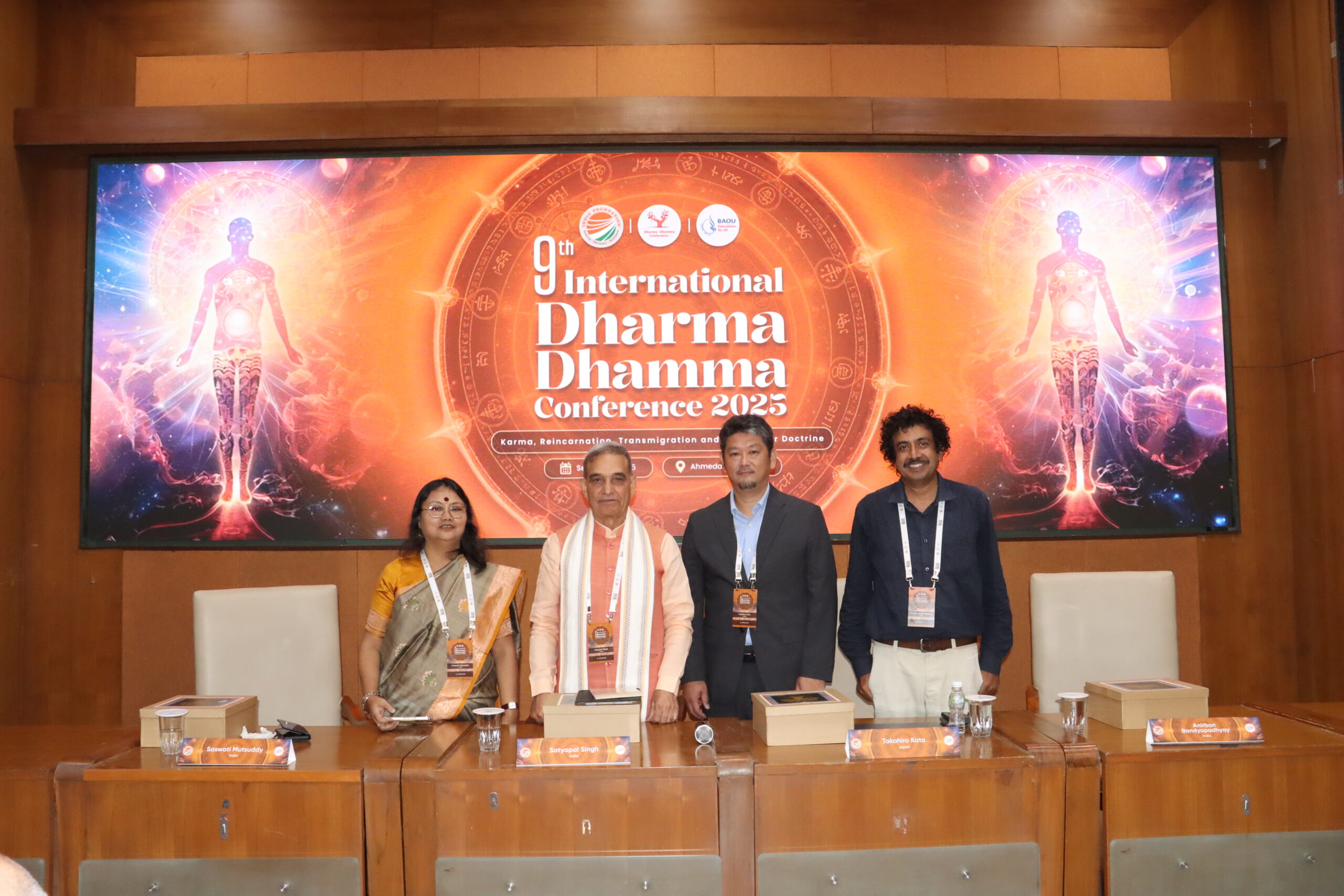
The third plenary session of the 9th International Dharma Dhamma Conference deepened the exploration of the theme “Karma, Reincarnation, Transmigration and The Avatar Doctrine” by weaving together perspectives from philosophy, science, and Buddhist studies.
Dr. Satyapal Singh, Former Chancellor, Gurukul Kangri University, Haridwar, and Former Union Minister of State, India, chaired the session. He emphasized that the theme of the conference touches the very essence of life, observing that the true path to happiness lies in Dharma. Quoting Dharmo rakṣati rakṣitaḥ (Dharma protects those who uphold it), he underlined that Dharma and Dhamma are universal, transcending boundaries of faith or culture. He also drew attention to the idea of cosmic consciousness and reflected that the roots of the Vedas are, in essence, the roots of science.
Prof. Takahiro Kato, Professor, Department of Indian Philosophy and Buddhist Studies, University of Tokyo, Japan, examined the relationship between karma, determinism, and moral responsibility. He explained how Indian traditions conceptualize karma not only as individual action but also as a shared responsibility, drawing on Mīmāṁsā’s principle of beneficiary designation and Buddhist practices of merit dedication. Citing the Mahābhārata, he reflected on how Indian thought reconciles determinism with freedom, presenting a nuanced form of compatibilism in which actions are conditioned by the past but remain open to ethical choice in the present.
Dr. Anirban Bandyopadhyay, Senior Scientist, National Institute for Materials Science (NIMS), Tsukuba, Japan, brought a scientific and personal dimension to the discussion. Recalling the experience of witnessing death in his family, he connected his reflections to avatāra and reincarnation through the lens of Sāṅkhya philosophy and the debates of Maharshi Kapil. He introduced the framework of Kālacakra, describing it as the rhythm of time, existence, and consciousness, and linked these insights to modern medical science, where bodily vibrations and energy flows are central to understanding life. By presenting Kālacakra as a shared language between philosophy and science, he offered a bridge between ancient traditions and contemporary knowledge systems.
Prof. Saswati Mutsuddy, Professor and Head, Department of Pali, University of Calcutta, India, emphasized that karma forms the very foundation of existence in Buddhism, governed by the universal law of cause and effect. Quoting the Buddha’s injunction Appadīpo Bhavah (be a light unto yourself), she highlighted the importance of self-reliance and inner strength. She explained how the Pañchaśīla (Five Precepts) and the role of chetanā (intention) guide ethical action, and stressed that no karma is without consequence. She further reflected on samādhi as the active discipline of the mind, clarifying that calmness is not passivity but cultivated clarity and strength, vital for understanding reality and moving toward liberation.
Plenary Session 4 – Day 3
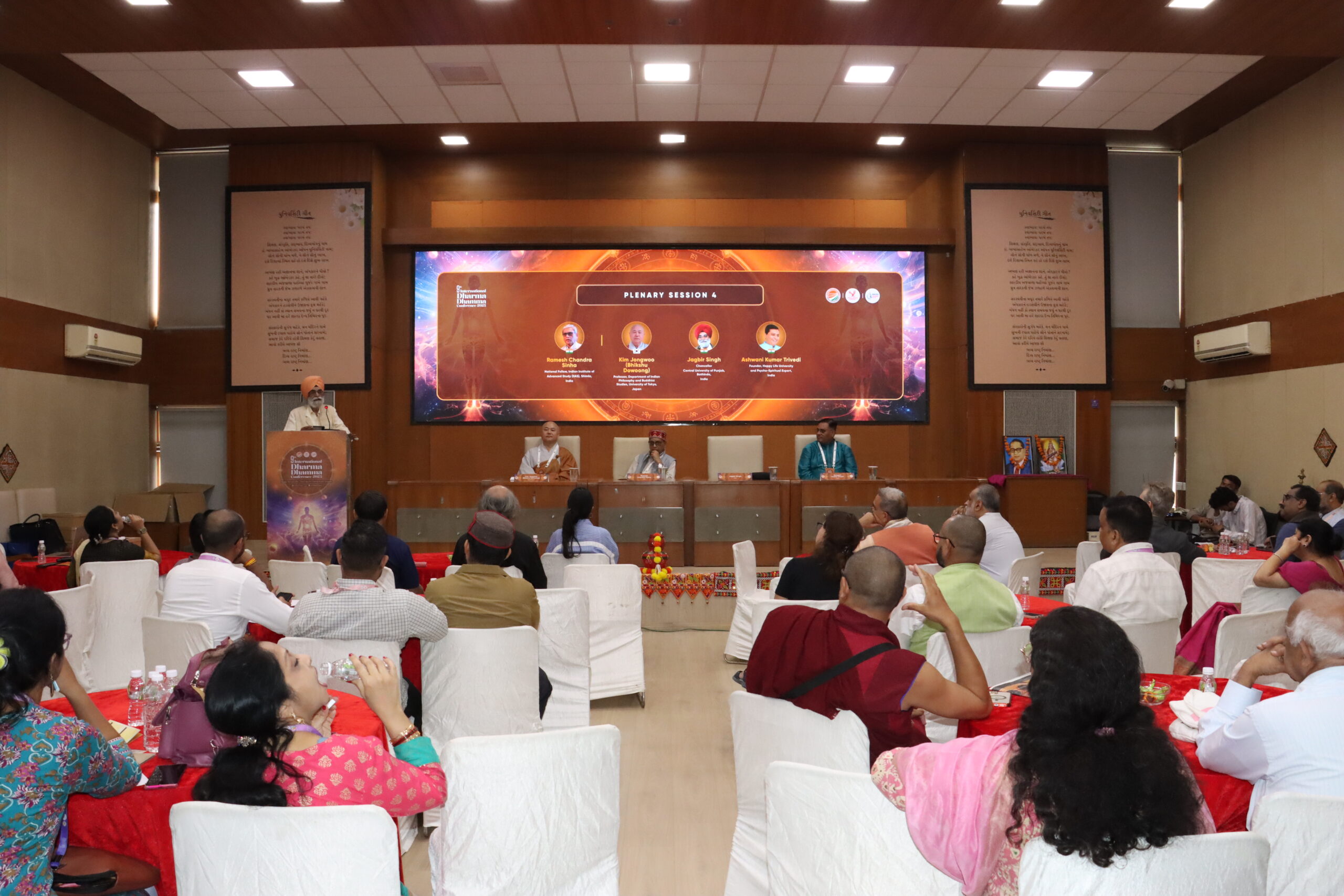
The fourth plenary session of the 9th International Dharma Dhamma Conference continued the dialogue on “Karma, Reincarnation, Transmigration and The Avatar Doctrine”, highlighting philosophical, cultural, and psycho-spiritual perspectives.
Prof. Ramesh Chandra Sinha, National Fellow, Indian Institute of Advanced Study (IIAS), Shimla, India, chaired the session. He emphasized the profound significance of the central theme and reflected on the depth of the concept of karma and the broader karma theory. He noted that the study of karma transcends a single tradition, representing a meaningful fusion of cultures and serving as a bridge for dialogue and understanding between diverse philosophical heritages.
Prof. Jagbir Singh, Chancellor, Central University of Punjab, Bathinda, India, highlighted the deep connection between Sanatan Dharma and the Sikh tradition. He observed that while Sanatan Dharma represents the ancient, the Sikh parampara reflects the new, yet both share the same cultural and spiritual continuum. Citing scholars such as Max Arthur Macauliffe, he discussed the enduring vibrancy of Sikh civilization, the unbroken lineage of knowledge (jñāna parampara), and the teachings of Guru Nanak Ji. He referred to the Ṛgveda’s eternal truth, “Ādi Sach, Jugādi Sach,” connecting it to Vedic concepts of Om and Brahman as the ultimate reality (Satyam Jñānam Anantam Brahma), and reflected on the relationship between the individual soul and the supreme Brahman.
Mr. Kim Jongwoo (Bhikshu Dowoong), Korea Sanskrita Shiksha Sansthanam (KSSS), South Korea, discussed the role of scripts and languages in preserving and transmitting cultural and spiritual heritage. He highlighted the historical significance of Devanagari and Brahmi scripts in Buddha Dharma and emphasized the meticulous rules guiding sacred text translation across regions. He also reflected on Buddhist art and sculptures as carriers of Dharma. Drawing parallels to Korea, he described the creation of the Hangul script, woodblock mantras, and the architectural and spiritual significance of Korean Buddhist temples, underscoring the deep interconnections between language, art, and living Buddhist tradition.
Mr. Ashwani Kumar, Founder of Happy Life University and psycho-spiritual expert, presented a consciousness-centered perspective on karma and energy. He emphasized that all beings are constantly in action, but the nature of karma varies across life forms—guided by instinct in animals, and by both instinct and intellect in humans. Highlighting the human tendency to be ensnared by the illusions of maya, he explained that true karma is measured by conscious alignment with dharma and divine will rather than mere outcomes. He outlined the soul’s journey through reincarnation and transmigration and illustrated the concept with the analogy of a spiritual GPS, termed God’s Guidance System (GGS), which directs the soul toward its ultimate cosmic purpose.
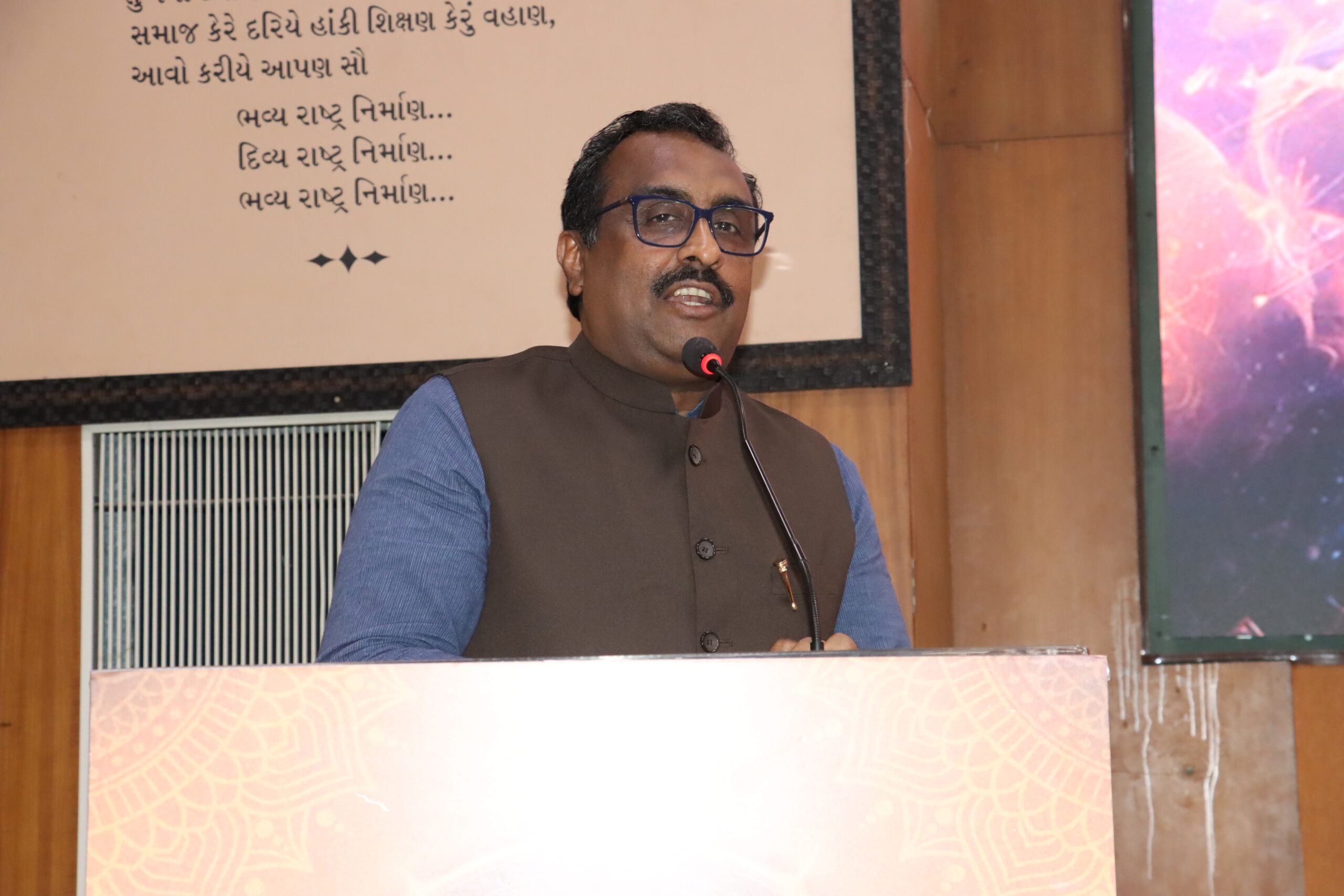
Dr. Ram Madhav, President, India Foundation, delivered the concluding remarks, reflecting on the intricate interplay between the theme of the conference and consciousness and emphasizing that individual perception significantly shapes the realization of future outcomes. He highlighted the importance of empirical research to further deepen understanding in these domains and underscored the ongoing need for rigorous scholarly inquiry into the principles of Dharma and Dhamma.


